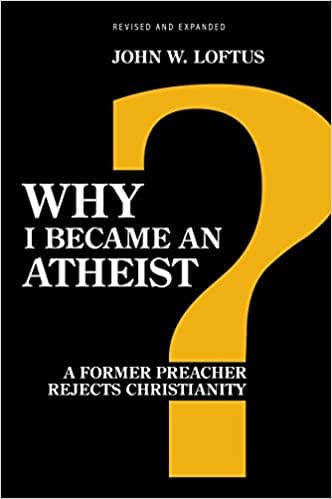
Atheist anti-theist Jonathan M. S. Pearce is the main writer on the blog, A Tippling Philosopher. His “About” page states: “Pearce is a philosopher, author, blogger, public speaker and teacher from Hampshire in the UK. He specialises in philosophy of religion, but likes to turn his hand to science, psychology, politics and anything involved in investigating reality.” His words will be in blue.
*****
I am replying to Pearce’s paper, Armstrong, the Genesis Flood Contradictions and Multiple Sources (7-2-21), which in turn was a response to my Pearce’s Potshots #36: Noah’s Flood: 40 or 150 Days or Neither? (7-1-21).
As is obvious from the title of my previous paper, I didn’t set out to refute or even engage the Documentary Hypothesis (DH): which (full disclosure, if it isn’t obvious) I reject. I simply provided three critical papers of mine: one being a collection of links. My point of view could be set forth without reference to whatever position one holds on the DH, because it was claimed that contradictions existed in the biblical text (i.e., however constructed or by whom) as to the length of Noah’s Flood.
A person who accepts the inspiration and infallibility of the Bible (as I do, and as the Catholic Church does) think that it doesn’t contradict whether or not some form of DH is true and an accurate understanding of the Pentateuch / Torah. Thus, all his carping on about DH is perfectly irrelevant to my argument. I specifically chose one part of his argument: the claim of contradiction. Pearce wrote in his paper that I responded to:
[I]n one part of Genesis the flood is 40 days and nights, and in another it is 150 days. These sorts of contradictions . . . [my bolding and italics]
In his present paper he refers back to this:
I posted a quick, “Look, here’s a biblical Genesis flood contradiction, and it’s one of the famous ones for illustrating the multiple source issue”.
He assumes it is a contradiction and then proposes that multiple authorship (good ol’ DH) can explain the “contradiction.” Like the socratic that I am, I go right to the premise. I deny that the contradiction is present in the text in the first place. That’s a matter of logic and exegesis, not elaborate, wildly speculative and subjective theorizing as to authorship. Two texts can contradict whether one author wrote them or two. They can also be logically consistent whether one author wrote them or two. Therefore, the question of DH is, to repeat, a non sequitur in relation to the very particular, specific argument I was making.
But I do want to briefly address one arrogant charge and falsehood that Pearce throws out:
[N]o serious Pentateuchal scholar adheres to the mosaic authorship and single-source proposal for the Pentateuch. I have listened to countless scholars attest to this. No conference, no symposium, no meeting for the Society of Biblical Literature entails any scholar advocating for mosaic authorship or a single source of the Pentateuch. It just doesn’t happen.
Yet the view of Mosaic authorship is very common. In apologetics only. There is a vast chasm that separates serious Hebrew Bible scholarship and Christian apologetics.
One of the articles I linked to in my collection of critical articles about the DH was “The Documentary Hypothesis” (Alice C. Linsley, Just Genesis, 1-11-10). She writes:
Catholic writer Mark Shea provided (in 2002: link unable to be found) a funny satire on Documentary Theory, using The Lord of the Rings:
One standard staple of biblical criticism for the past century has been the theory that the Old Testament isn’t composed of “books” that somebody “wrote” but is instead a pastische of “sources” that religio political factions “assembled”. If you find yourself thinking “Only an academic–and a German one–could suppose that the foundational literature of Western civilization could be pasted together by a committee and only an academic–and a German one–could suppose that you find out what the text really means by dissolving it in the acid bath of deconstruction to tease out the supposedly original Yahwist (J), Elohist (E), Priestly (P) and Deuteronomic (D) sources”, you’re right. The theory has run into trouble (since nobody seems to agree on which cut n paste fragments belong to which source and nobody knows why the editors who allegedly stuck all these sources together did what they did. But, as with pure naturalistic theories of evolution, your task is to shut up and bow to your superiors, not ask obvious questions.
In the spirit of redaction criticism, Bruce Baugh now offers some preliminary theories on the variation in sources used by the makers of the Two Towers. I think he’s on to something. Jackson is clearly operating from Rohanian sources for purely political reasons. Truly educated people can see these things right off the bat. It’s obvious to any thinking person that the whole “Tolkien Authorship Myth” must go. The Lord of the Rings was not “written” by a so-called “author” named “Tolkien”. Rather, it is a final redaction of sources ranging from the Red Book of Westmarch, to Elvish Chronicles, to Gondorian records, to tales of Rohirrim which were only transcribed centuries later. The various pressure groups which preserved these stories all had their own agendas. For instance, the Gondorian records clearly seek to elevate the claims of the Aragorn monarchy over the house of Denethor. So the record has been sanitized. Indeed, many scholars now believe the “Faramir being healed by Aragorn” doublet of the “Frodo being helped by Aragorn” is a sanitized version of the murder of Denethor by Aragorn through the administration of poison. “Faramir” never existed and is a corruption of “Boromir”, who died under uncertain circumstances in the wilderness. Since the scenes of Aragorn healing “Frodo” also take place in the wilderness, most scholars conclude that “Frodo” is a mythic echo of Boromir, whose quest for Power is like Aragorn’s quest for the Throne. Perhaps, Boromir was one of Aragorn’s first victims. Of course, the whole “Ring” motif appears in countless folk tales and is to be discounted altogether. The real “War of the Ring” was doubtless some small tribal dispute that was exaggerated by bardic sources, much like the Exodus or the Fall of Troy. Gandalf appears to have been some sort of shamanistic figure, introduced to the Narrative by W (the Westmarch source) out of deference to local Shire cultic practice.
Rohan seems to have been of much help to the establishment of the Aragorn monarchy and so R sources find their way into the final version of the LOTR narrative, but greatly altered so as to give Theoden a subordinate role. Meanwhile, we can only guess at the Sauron and Saruman sources, since they seem to have been destroyed by the victors and give a wholly negative view of these doubtlessly complex, warm, human and many-sided figures. Scholars now know, of course, that the identification of Sauron with “pure evil” is simply wrong. Indeed, many scholars have become quite fond of Sauron and are searching the records with a growing passion and zeal for any lore connected with the making of the One Ring. “It’s all nonsense, of course,” says Dr. Gol M. Smeagol, “There never was such a Ring. Still… I… should… very much like to have a look at it. Just for scholarly purposes of course.”
That noted, we move on.
*
I am supremely confident in what I am claiming, . . .
*
Excellent! Then maybe he will interact point-by-point with my argument this time: a thing that he scarcely did in this paper.
*
Perhaps I am just really bad at this. I apologise to you all.
*
I appreciate it. That’s much more likely. He’s a prisoner of his own relentlessly false presuppositions.
*
Armstrong, in looking for some “win scenario” took on the simple claim of the flood lasting 40 days and nights vs 150 days and went with it, broadly writing a piece on how the rains lasted forty days but the flood took 150 days to recede, so there is no contradiction,
*
Yes I did. That was my issue. I pick out things that can be objectively discussed, as matters of logic (+ exegesis, if required) or fact. This was one such item. I have a long history of dealing with alleged biblical contradictions, as Pearce himself is, I think, well aware.
*
and isn’t Pearce rubbish…
*
Not Pearce, just many of his nonsensical and incoherent or factually dubious arguments.
*
The thing is, I have to respond because there will be lurkers here who might want to know how to respond to things like this.
How kind and considerate of him.
What he failed to quote was some in-between bits. But before we get onto that, literally look at his own quote:
Genesis 8:3-4 and the waters receded from the earth continually. At the end of a hundred and fifty days the waters had abated; [4] and in the seventh month, on the seventeenth day of the month, the ark came to rest upon the mountains of Ar’arat.
Genesis 8:5 And the waters continued to abate until the tenth month; in the tenth month, on the first day of the month, the tops of the mountains were seen.
This makes no sense. The waters abated at the end of 150 days.
Yes, after 150 days they reached their highest level and started to recede. “Abate” according to Dictionary.com means “to reduce in amount, degree, intensity, etc.; lessen; diminish:” It doesn’t mean “disappear.” Likewise, the Hebrew word châsêr (“abate” in Gen 8:3; Strong’s word #2637) means, in this instance, “to fail, to be lessened”: according to Gesenius’ Hebrew-Chaldee Lexicon: a standard Hebrew linguistic reference.
Various English translations of Genesis 8:3 more clearly indicate that the waters just started the process of receding after 150 days. They weren’t totally gone (hence, the passage is not saying that the entire Flood was over, with all the additional flood water on the earth’s surface totally gone):
NIV . . . At the end of the hundred and fifty days the water had gone down,
NKJV . . . At the end of the hundred and fifty days the waters decreased.
NASB . . . at the end of 150 days the water decreased.
Amplified Bible . . . At the end of a hundred and fifty days the waters had diminished.
ASV . . . after the end of a hundred and fifty days the waters decreased.
Douay-Rheims . . . and they began to be abated after a hundred and fifty days.
JPS Tanakh 1917 . . . after the end of a hundred and fifty days the waters decreased.
Knox . . . beginning to abate, now that the hundred and fifty days were over.
Moffatt . . . began to subside . . .
Armstrong has quoted himself into a corner! This is precisely what the DH/SH solve.
Also, we have a verse that he did include, but didn’t dwell on. I use, always where possible, the NASB as a Bible translation as it is renowned as the most accurate. Here is Genesis 7:17:
17 Then the flood came upon the earth for forty days, and the water increased and lifted up the ark, so that it rose above the earth.
The footnote for the “flood came” is that is can be translated as “it was”. So, here we have the flood was “upon the earth for forty days”. NOT, it rained for forty days, but “it was upon the earth for forty days” and “it lifted up the ark”. The waters lifted up the ark for forty days, not the rain from above.
We know this is a differentiation from the idea of it raining for forty days because Genesis 7:12, from which 17 is an idea continuation, states:
12 The rain fell upon the earth for forty days and forty nights.
Let’s put them together:
12 The rain fell upon the earth for forty days and forty nights.
17 Then the flood came upon the earth for forty days, and the water increased and lifted up the ark, so that it rose above the earth.
At most, at best for Dave, we have a 40-day rain and then a 40-day flood (80 days in total).
This is just silly. Plainly, in context, this particular use of flood was synonymous with the forty days of rain. Hence, some Bible translations make this equation crystal-clear:
Knox For forty days that flood came down on the earth . . .
Moffatt For forty days and forty nights rain fell upon the earth . . .
Amplified Bible The flood [that is, the downpour of rain] was forty days . . .
Pearce tries to play with cross-referencing to force the larger text to fit into his erroneous schema, by asserting that Genesis 7:12 and 7:17 differentiate “rain” and “flood” (even though both refer to forty days). I could just as well do cross-referencing with regard to “waters” / “water.” After all, 7:17 refers to “the flood” and then appears to equate this with “the water increased” (as opposed to saying “then it subsided” or “then it dried up”). In Pearce’s ridiculous, contrived, and mythical 80-day Flood, the water would have to dry up after the second forty-day period referred to in 7:17. But it does not do so. Rather, “the water [“waters” in RSV] increased.”
In fact, “flood” and “water[s]” appear together, in a synonymous use seven times in RSV, in Genesis 6, 7, and 9 (including 7:17):
“flood of waters”: 6:17; 7:6
“waters of the flood”: 7:7, 10
“The flood . . . the waters increased”: 7:17
“waters of a flood”: 9:11
“the waters shall never again become a flood to destroy all flesh”: 9:15
If we are to consult immediate context, Genesis 7:18-20, 24 repeat four times that “the waters prevailed”: with 7:24 adding that they did so “a hundred and fifty days” (not forty or eighty!). It was after 150 days that the waters “subsided” (8:1), “receded from the earth continually” (8:3) and “abated” (8:3). They “continued to abate until the tenth month” (8:5), which was the eighth month after it started to rain (see 7:11). The waters didn’t totally dry up till “the first month, the first day of the month”: when “the waters were dried from off the earth; . . . the face of the ground was dry” (8:13). This was about ten-and-a-half months from the beginning of the torrential rains, and it was when the Flood ended, in any reasonable reading of the plain texts.
Therefore, Pearce’s “exegesis” (or I should say, eisegesis) is atrocious, as always. He sees only what he wants to see, and this is the hallmark of all skeptical, hostile, hyper-rational “can’t see the forest for the trees” eisegesis and Bible “interpretation” [choke] from those who approach the Bible like a butcher approaches a hog: big knife in hand.
Now let’s see the in-between bit he forgot to quote:
Genesis 8:6:6 After forty days Noah opened a window he had made in the ark 7 and sent out a raven, and it kept flying back and forth until the water had dried up from the earth. 8 Then he sent out a dove to see if the water had receded from the surface of the ground.
So, next, he opens the window after the fortieth day! How convenient Armstrong forgot this.
Genesis 8:6: “At the end of forty days” (RSV) is not forty days after the beginning of the Flood, but forty days after the time mentioned in the previous verse: ” in the tenth month, on the first day of the month . . .” That’s the context. Then after Noah sent the raven and the dove out, 8:13 asserts: “in the first month, the first day of the month, the waters were dried from off the earth” (the end of the Flood).
Then Pearce tries to smuggle in another alleged pseudo-“contradiction” having nothing to do with the duration of the Flood:
Let’s look at the wider context (don’t read the NIV translation as they try to bodge this in utter dishonesty):
Genesis 7:2-3:2 You shall take with you seven pairs of every clean animal, a male and his female; and two of the animals that are not clean, a male and his female; 3 also of the birds of the sky, seven pairs, male and female, to keep their offspring alive on the face of all the earth.
And:
Genesis 6:19: 19 And of every living thing of all flesh, you shall bring two of every kind into the ark, to keep them alive with you; they shall be male and female.
What a pointless repetition even if it didn’t contradict.
I have dealt with this already: Seidensticker Folly #49: Noah & 2 or 7 Pairs of Animals [9-7-20] I have refuted atheist anti-theist Bob “the Bible Basher” Seidensticker now 72 times: without a single peep of a reply.
Pearce then goes into reams of more analysis of DH (which is utterly beside the point of my paper) and chastises the Bible for “Repetition, redundancy and contradiction”. To the contrary, “repetition is a great teacher.” I typed in those words for a Google search and tons of stuff came up. Pearce seems oblivious to the possibility that such repetition was a deliberate tactic of one author, rather than supposed proof of multiple authors. If he wants to see “redundancy” Genesis 7:6-13 can’t hold a candle to Psalm 136. It repeats the same phrase: “for his steadfast love endures for ever” 26 straight times, in as many verses.
The sad end result (for him) is that Pearce hasn’t refuted a single point of my paper, whereas I have now strengthened and bolstered my argument all the more, which I always do when a challenge is kept up or increased (unless, of course, it is something I have conceded; and I do gladly concede where the facts and arguments and evidence warrant it; just as I did in a major way in converting to Catholicism from evangelical Protestantism).
***
ADDENDUM: Pearce’s “Reply”
Ruddy Flood Thing Again. And Armstrong. (7-3-21)
Here, Pearce doesn’t interact with even a single one of my many exegetical arguments against his charge of contradiction as to the duration of the Flood. He simply repeats endlessly his uncritical praise of the Documentary Hypothesis. At least he was kind enough to include words of mine (seen above, near the beginning) that show how all of this is perfectly irrelevant to my own arguments, which never were about the Documentary Hypothesis in the first place (that’s his pet argument, but has nothing to do with mine):
My point of view could be set forth without reference to whatever position one holds on the DH, because it was claimed that contradictions existed in the biblical text (i.e., however constructed or by whom) as to the length of Noah’s Flood.
A person who accepts the inspiration and infallibility of the Bible (as I do, and as the Catholic Church does) think that it doesn’t contradict whether or not some form of DH is true and an accurate understanding of the Pentateuch / Torah. Thus, all his carping on about DH is perfectly irrelevant to my argument. I specifically chose one part of his argument: the claim of contradiction.
Thank you, Jonathan. If only you could figure out that this renders all of your carping on and on about DH and how supposedly not a single Bible scholar in the history of the universe (with an IQ higher than a pencil eraser) has ever denied it or has been critical of it, null and void. You’re arguing one thing; I’m arguing another. We are literally ships passing in the night.
[for more on the Documentary Hypothesis, see: Jimmy Akin, “Who Wrote the Books of Moses?”, Catholic Answers, 1-1-13]
Rather than engage my exegetical arguments, Pearce — showing remarkable (and to me, surprising) intellectual cowardice — decides to opt out with sweeping, unsubstantiated generalities:
I don’t think any of your criticisms of my points hold water. . . .
If Armstrong seriously thinks he has answered my with his apologetic discourse here, trying to special plead his 40 vs 150 day issue is coherent, he is sadly mistaken. I really have nothing more to say since all of my original points hold. He just hasn’t touched them.
Pearce takes another misguided blank shot:
And as for the Epic of Gilgamesh, he didn’t even mention it.
Because he definitely has nothing to say to that.
It’s true that I didn’t in this paper, because it had nothing whatsoever to do with what I was arguing: which was a logical / exegetical matter having to do with a few biblical texts in Genesis. And that was, of course, why I didn’t deal with it: not Pearce’s wishful mythology that my mouth and mind are sealed shut as to that issue, in abject fear, due to his profoundly unanswerable utterances.
In fact, I dealt with it several times in my companion-paper, also posted yesterday, along with this present one, in response to someone in his own combox (and announced in the same place): Local Flood & Atheist Ignorance of Christian Thought (7-2-21; revised a few times today on 7-3-21, as I found some more interesting and relevant material).
I dealt with it at the very end of the paper, noting that two reputable Protestant scholarly sources that I cited at length and linked to (online versions in their entirety) both addressed the issue. It was in the initial version of the paper before I added material to it and removed some, excepting the very last sentence, that I added today. All of it was written before I read Pearce’s new article today, making this criticism. Thus, his statement that I allegedly have “nothing to say to that” is ridiculous (adding to a long collection of such utterances of his against me — and the Bible — and Christianity). Anyway, here is the end section of my “Local Flood” article from yesterday:
[Baptist theologian Bernard] Ramm [author of The Christian View of Science and Scripture] also discusses “The Babylonian Flood account” on pages 247-249. It can be read online at the link. In the International Standard Bible Encyclopedia, George Frederick Wright (see the link above) also devotes significant space to it in his sections 9 and 10: for those who want to understand the true nature of the comparison of the Babylonian and biblical accounts. Here are a few striking differences, as elucidated by Wright:
The dimensions of the ark as given in Ge (6:15) are reasonable, while those of Berosus and the cuneiform tablets are unreasonable. According to Gen, the ark was 300 cubits (562 1/2 ft.) long, 50 cubits (93 2/3 ft.) wide, and 30 cubits (56 1/4 ft.) deep, which are the natural proportions for a ship of that size, being in fact very close to those of the great steamers which are now constructed to cross the Atlantic. The “Celtic” of the White Star line, built in 1901, is 700 ft. long, 75 ft. wide and 49 1/3 ft. deep. The dimensions of the “Great Eastern,” built in 1858 (692 ft. long, 83 ft. broad, and 58 ft. deep), are still closer to those of the ark. The cuneiform tablets represent the length, width and depth each as 140 cubits (262 ft.) (II. 22, 23, 38-41), the dimensions of an entirely unseaworthy structure. . . .
The accounts differ decidedly in the duration of the Flood. According to the ordinary interpretation of the Biblical account, the Deluge continued a year and 17 days; whereas, according to the cuneiform tablets, it lasted only 14 days (II. 103-7, 117-22). . . .
[T]he duration of the Deluge, according to Genesis, affords opportunity for a gradual progress of events which best accords with scientific conceptions of geological movements. If, as the most probable interpretation would imply, the water began to recede after 150 days from the beginning of the Flood and fell 15 cubits in 74 days, that would only be 3 2/3 inches per day–a rate which would be imperceptible to an ordinary observer.
Despite these massive differences, (((J_Enigma23))) on Pearce’s blog wrote:
As stated numerous times, the Biblical flood also reads very much like the Flood myth from the Epic of Gilgamesh.
Right. The Babylonian ark was 262 feet wide, deep, and long (a giant cube), whereas the biblical ark has similar proportions to actual ocean liners in our time. The biblical Flood lasted over a year, and the waters subsided over seven months’ time. But the Babylonian Flood lasted 14 days. That doesn’t sound “very much like” to me. There are several parallels that can be drawn, but having massively different boat descriptions and duration lengths are certainly essential differences.
I have also addressed it (albeit briefly) now and then in my 3600+ apologetics articles through the years. For example, in one of my 46 utterly unanswered refutations of atheist David Madison (dated 8-7-19), I wrote:
It’s often noted that there is a Deluge account in the Epic of Gilgamesh; therefore, this casts doubt on the story of Noah’s Flood. But why would it? Is it not more plausible to assert that if in fact (for the sake of argument) such a major Flood had occurred, that other cultures besides Hebrew culture would more likely know about it, rather than not? Say for the sake of argument that the Bible had mentioned Halley’s Comet. We now know that it passes by the earth every 76 years. No doubt many cultures have some written record of observing it. But if the Bible had happened to mention it, it would immediately be suspect because non-Hebrews also wrote about it? Clearly not. . . .
In fact, Catholic apologist G. K. Chesterton, in his masterpiece, The Everlasting Man, argued that it is precisely to be expected, and is an argument in favor of Christianity, that there are many precursors to it: especially in the paganism that flourished in the previous 500 years or so. Anglican apologist C. S. Lewis, in his book, The Abolition of Man, has a section at the end (“Illustrations of the Tao”) in which he shows (and rejoices in) many similarities of world religions.
Young Lewis (very much like myself in my teen years) was enthralled with Norse mythology and Wagner’s operas, etc., and was an atheist. He became a theist after a discussion with J. R. R. Tolkien, in which the latter noted that “Christianity was a true myth.” It had never occurred to Lewis that there could be such a thing as a myth that actually happened. I have written about supposed “pagan elements” in Catholicism: which is a charge that anti-Catholic Protestants often make. It’s fascinating to now see an atheist former Methodist minister use the same fallacious tactic:
I had also dealt with it in an analysis of a deconversion story, about four months earlier (3-28-19):
[words of an atheist, in green] One week, he began a 4 part series on the story of Noah and the flood. He came at it from a totally different perspective than I had ever heard or thought of before, and I was enthralled. On the 4th Sunday, he mentioned that there were different interpretations of the story within the church, and he brought up the fact that the flood story actually appeared in earlier writings that were not biblical at all. I was stunned. Could it be true that the bible borrowed the flood story from earlier secular writings (hint: Epic of Gilgamesh)? It was just a fable?
Huh? The reasoning here is very convoluted. How is it that simply because another culture also had a story of a massive Flood, therefore, somehow it becomes a “fable”? Isn’t it much more likely and plausible that an event of such shattering magnitude would be recorded by someone besides the Hebrews? Therefore, the mere presence of a similar story elsewhere is no disproof of the biblical account at all.
Pagan or heathen parallels or precursors do not necessarily “disprove” the biblical account. Thus, The Catholic Encyclopedia (1913) notes how such parallel stories of the Flood, confirm, rather than disconfirm, the historicity and trustworthiness of the Bible:
The historicity of the Biblical Flood account is confirmed by the tradition existing in all places and at all times as to the occurrence of a similar catastrophe. F. von Schwarz . . . enumerates sixty-three such Flood stories which are in his opinion independent of the Biblical account. R. Andree . . . discusses eighty-eight different Flood stories, and considers sixty-two of them as independent of the Chaldee and Hebrew tradition. Moreover, these stories extend through all the races of the earth excepting the African; these are excepted, not because it is certain that they do not possess any Flood traditions, but because their traditions have not as yet been sufficiently investigated. Lenormant pronounces the Flood story as the most universal tradition in the history of primitive man, and Franz Delitzsch was of opinion that we might as well consider the history of Alexander the Great a myth, as to call the Flood tradition a fable. It would, indeed, be a greater miracle than that of the Deluge itself, if the various and different conditions surrounding the several nations of the earth had produced among them a tradition substantially identical. Opposite causes would have produced the same effect.
I was deeply shaken to realize that the bible was not the historically accurate document I was always told and completely believed it was.
I don’t know why. It certainly wasn’t because of the above things mentioned, because that conclusion simply doesn’t follow.
That’s an awful lot from someone who (according to the inimitable and polemics-prone Jonathan Pearce) supposedly “definitely has nothing to say” about the topic, ain’t it?
***
Photo credit: Noah: The Eve of the Deluge (1848), by John Linnell (1792-1882) [public domain / Wikimedia Commons]
***
Summary: Atheist Jonathan MS Pearce invents pseudo-“contradictions” & engages in lengthy irrelevant diversions on the Documentary Hypothesis, in analyzing the length of Noah’s Flood.



























